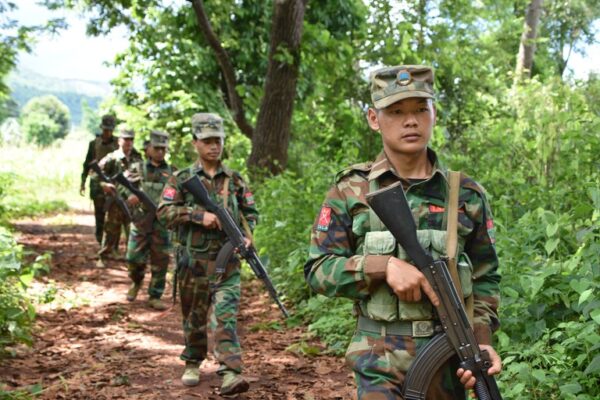
Junta shelling kills man, forces residents to flee village in Myanmar’s Shan state
Myanmar’s military shelled a village in Shan state, killing a man and forcing most residents to flee, locals told RFA Wednesday. The local killed in Tuesday’s attack on Muse township’s Hseng Hkawng village was identified as 40-year-old Aik Lau by a villager who goes by the name Cherry. “He was sitting outside the house and his face and back were hit when the heavy artillery shell landed and exploded,” Cherry told RFA. “Another house was hit and one person was injured in the thigh.” The village has around 200 residents, most of whom fled after the explosion. Locals said most of the villagers are from the Ta’ang (Palaung) ethnic group. A resident of a nearby village said there was a battle between junta troops and the Ta’ang National Liberation Army in the township on Tuesday morning. They said troops fired a 60-millimeter heavy weapon from a bridge next to Nam Aum village, damaging some houses in Hseng Hkawng. The troops then raided Kawng Wein village, 0.8 kilometers (half a mile) from Hseng Hkawng and interrogated locals. Ta’ang National Liberation Army troops in a photograph taken on July 12, 2022. Credit: RFA The ethnic army has been active near those villages, fighting with about 200 soldiers in the last few days, and the military junta has been shelling villages since Monday, according to locals. Some shops and houses in Nam Aum village were destroyed by shelling and troops sent an attack helicopter to fire on the village on Tuesday, residents told RFA on condition of anonymity for fear of reprisals. RFA’s calls to junta council spokesperson for Shan state, Khun Thein Maung, went unanswered Wednesday. A Ta’ang National Liberation Army information officer, who declined to be named for security reasons, told RFA he did not know the exact situation on the ground. Fighting across Myanmar since the junta extended the state of emergency on Feb. 1, 2023 has left 383 civilians dead, according to data from the BNI-Myanmar Peace Monitor, a group that compiles data on the military conflict. The United Nations Office for the Coordination of Humanitarian Affairs (UNOCHA) announced on July 15 that nearly two million people have fled their homes due to armed fighting and insecurity across the country since the Feb. 1, 2021 coup. Edited by Mike Firn and Taejun Kang.




